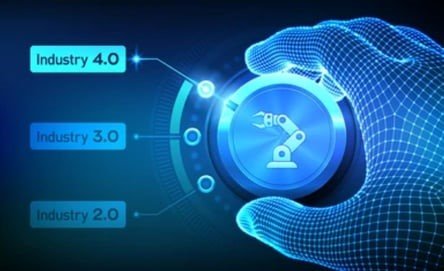Chatbots in Industry: Innovation and Efficiency in Industry 4.0
Digital Transformation in manufacturing industry rises day by day, cutomize your business needs with Skymod AI!
October 1, 2023
Gizem Argunşah
Industry 4.0 represents a transformative movement in the industrial sector, characterized by the integration of smart factories, the Internet of Things (IoT), big data, and artificial intelligence (AI). In this article, we will explore how chatbots are integrated with Industry 4.0 and how they benefit businesses.

Key Components of Industry 4.0: A Closer Look
Industry 4.0 is fundamentally about connectivity and the intelligent use of data. Let’s delve deeper into the building blocks of this transformation:
Internet of Things (IoT): The IoT forms the nervous system of Industry 4.0. Machines and objects become seamlessly networked, generating real-time data on everything from energy consumption and material flow to temperature fluctuations that could signal an impending malfunction.
Big Data and Data Analytics: Industry 4.0 means making sense of an unprecedented amount of information. Advanced analytics and big data platforms are essential to transform raw numbers into actionable insights. Analyzing production data can optimize resource usage, improve forecasting, and even allow customized product offerings at scale.
Artificial Intelligence (AI): AI is the ‘brain’ that gives Industry 4.0 its power. Machine learning algorithms continuously learn from the data, enabling systems to anticipate equipment needs, adjust processes for peak efficiency, and take over routine tasks. AI isn’t just about automation; it can also explore new design solutions and generate product innovation.
Chatbots: The Catalysts of Industry 4.0 Transformation
Powered by AI and natural language processing, chatbots are the approachable face of Industry 4.0. They enhance this transformation by:
Streamlining Human-Machine Interaction: Workers can request information or initiate actions through simple conversations with a chatbot. This breaks down barriers and empowers those on the front lines to leverage the power of Industry 4.0 without specialized technical knowledge.
Proactive Maintenance and Troubleshooting: Chatbots act as tireless early warning systems, identifying equipment anomalies in real-time. They can send targeted alerts and guide maintenance teams through diagnostics and repairs, reducing downtime and preventing major disruptions.
Data-Driven Decision Support: Managers need a clear view into complex manufacturing processes. Chatbots translate raw data into digestible visualizations and reports, aiding decision-making and revealing opportunities to enhance operations.
Transforming Customer Service and Supply Chain: Chatbots act as 24/7 customer support, providing order updates, answering questions, and even facilitating purchases. They can monitor shipments, predict potential disruptions, and streamline the flow of information throughout the supply chain.
The Future: A Symbiotic Partnership
As chatbot technology and AI advance, their integration with Industry 4.0 will only deepen. Expect to see:
Hyper-personalized Training and Knowledge Transfer: Chatbots won’t replace experienced workers but will act as their intelligent assistants. They can tailor training, provide step-by-step guidance for complex tasks, and become on-demand repositories of crucial technical knowledge.
Augmented Reality (AR) Support: Imagine a worker needing a complex repair. A chatbot integrated with AR could visually overlay instructions and schematics directly onto the worker’s field of view, transforming repairs into intuitive, guided processes.
Collaborative Robotics: Cobots are a growing presence in factories. Chatbots can act as the communication layer between humans and machines, ensuring tasks are coordinated, and workflows are optimized for combined human-robot teams.
Industry 4.0 is more than just technology; it’s about unlocking a new era of intelligent manufacturing. Chatbots are crucial pieces of this puzzle, making the benefits of this revolution accessible, actionable, and integral to daily operations.
